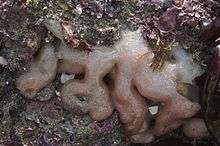Aplidium californicum
| Aplidium californicum | |
|---|---|
 | |
| Aplidium californicum | |
| Scientific classification | |
| Kingdom: | Animalia |
| Phylum: | Chordata |
| Subphylum: | Tunicata |
| Class: | Ascidiacea |
| Order: | Enterogona |
| Suborder: | Aplousobranchia |
| Family: | Polyclinidae |
| Genus: | Aplidium |
| Species: | A. californicum |
| Binomial name | |
| Aplidium californicum (Ritter & Forsyth, 1917)[1] | |
| Synonyms | |
|
Amaroucium californicum Ritter & Forsyth, 1917 | |
Aplidium californicum is a species of colonial sea squirt, a tunicate in the family Polyclinidae. It is commonly known as sea pork.
Description
Aplidium californicum is a compound tunicate forming sheets, mounds or slabs on rocks and other hard substrates. The tunic is jelly-like in consistency, 1 to 3 cm thick and a shiny yellow, orange, reddish-brown or a translucent white colour. The individual zooids are brown or buff, 6 mm long and arranged in oval or elongate systems. Each one is subdivided into a thorax, an abdomen and a postabdomen. There are usually 10 to 12 rows of perforations.[2][3]
Distribution
Aplidium californicum is common on the west coast of North America from British Columbia south to Baja California, Mexico and the Galapagos Islands.[2] It is found in the intertidal zone and at depths down to 85 metres.[3]
Biology
Aplidium californicum is a filter feeder. Water is sucked into the interior of the organism through a siphon and then expelled through another one. Phytoplankton and other small organisms get trapped in mucus threads secreted by the endostyle. The tunicate seems to form a symbiotic relationship with the bryozoan Bugula neritina.[4]
Certain antineoplastic agents, bryostatins 4 and 5, have been extracted from Aplidium californicum and are being evaluated.[4]
References
- ↑ Aplidium californicum (Ritter & Forsyth, 1917) World Register of Marine Species. Retrieved 2011-11-21.
- 1 2 Aplidium californicum Ascidians. Retrieved 2011-11-21.
- 1 2 Aplidium californicum (Ritter & Forsyth 1917) Archived April 7, 2012, at the Wayback Machine. Marine Biodiversity of British Columbia. Retrieved 2011-11-21.
- 1 2 Pettit GR, Leet JE, Herald CL, Kamano Y, Doubek DL (1986). "Antineoplastic agents, 116. An evaluation of the marine ascidian Aplidium californicum.". Journal of Natural Products. PubMed. 49 (2): 231–5. PMID 3734809. doi:10.1021/np50044a006.